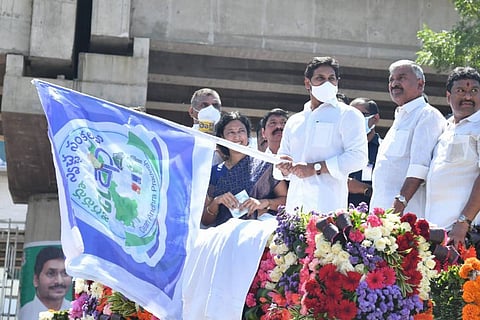

Chief Minister YS Jagan Mohan Reddy on Saturday, October 2, launched Clean Andhra Pradesh (CLAP) under the Swachh Bharat Mission 2.0 to make the state garbage and litter-free, with emphasis on visual cleanliness. At a programme in Vijayawada, he flagged off about 4,000 new garbage collection vehicles for deployment in various urban and rural local bodies. The state government is using funds under the 15th Finance Commission grant and also an amount of Rs 350 crore, which is being collected from urban residents as a user charge (garbage cess), for the programme.
The government is still working out the quantum of garbage cess to be imposed in rural areas, according to Panchayat Raj and Rural Development Minister Peddireddy Ramachandra Reddy. The government is also supplying 1.20 crore coloured (blue, green and red) bins for 40 lakh households in 124 ULBs, for primary segregation of waste at a domestic level. The procurement and supply of the 1.20 crore bins are estimated to have cost around Rs 72 crore, according to IANS.
For the door-to-door collection of waste, diesel auto tippers are set to be deployed in grade 1 and above category ULBs as part of phase one of this initiative, and 1,800 electric vehicles (auto-rickshaws) will be introduced in grade 2/3 category ULBs and Nagar Panchayats. Both the diesel auto tripper and electric vehicles will be equipped with Wet, Dry, and Domestic Hazardous waste partition bins with a hydraulic lift and a microphone. For the transportation of garbage/waste in grama panchayaths, 14,000 tri-cycle rickshaws are being distributed, and 1,000 auto rickshaws are being distributed to villages with a population of 10,000 or above.
The Swachh Andhra Corporation has also drawn up plans to set up 225 garbage transfer stations in the ULBs, where the primary waste collected from households will be compacted and sent to the treatment plants. A sum of Rs 220 crore from the 15th Finance Commission grant will be used for this. Municipal Administration Minister Botsa Satyanarayana said 72 integrated solid waste management plants would be set up in the state under the Public-Private Partnership model. Further, for the safe disposal of masks and sanitary napkins, 6,417 incinerators are to be distributed at all grama panchayats.
From collection to treatment of waste, CLAP aims to achieve total source segregation of garbage, mechanized door-to-door collection with community participation, onsite waste treatment, complete treatment of waste generated, and encourage home composting.
With PTI and IANS inputs